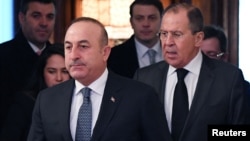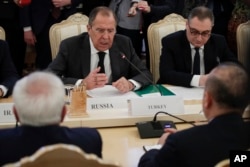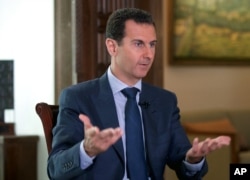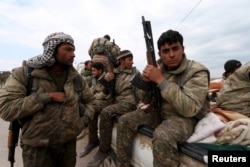Turkey and Russia negotiated intensely throughout December to reach a deal on a cease-fire in Syria, which took effect Thursday. But the two countries still back opposite sides in the fight, which raises questions for Ankara's role in reaching a lasting peace agreement.
“The cease-fire is an important step to resolve the Syrian conflict," Turkish presidential spokesman Ibrahim Kalin said Thursday. His statement said the Russian and Turkish presidents spoke Thursday to discuss the cease-fire and next month’s planned Syrian peace conference in Kazakhstan.
Kalin confirmed reports that since early December, Turkey had facilitated talks between Syrian rebel groups and Russian officials in Ankara.
Some political analysts in Turkey say the fact that Russia and Turkey have backed opposite sides in the war could offer the biggest chance that the cease-fire will succeed where other initiatives have failed.
“They are representing the two opposing sides in the Syrian civil war and they are negotiating,” notes political columnist Semih Idiz of the Al Monitor website. “This is why this may give help and credibility to this process. So anything they agree has some credibility.”
The Turkish foreign ministry has said it will work with Russia to support and monitor the cease-fire.
Opposite sides on Assad
Moscow is the main military backer of Syrian President Bashar al-Assad and has considerable leverage over his government. Analysts say Russian support was decisive in turning the tide of the war in Damascus’s favor.
Ankara, however, has been the most important supporter of the rebels, not only with aid, but also providing their main supply route.
Ankara is still at loggerheads with Moscow over the future role of Syria's President Assad. The Turkish Foreign Minister has reaffirmed Turkey’s call that Assad must be removed as part of any peace agreement. Both Moscow and Tehran reject the demand.
Questions remain over how far Ankara’s influence extends in the conflict. “Turkey is speaking for the Free Syrian Army, and groups fighting for it,” observes columnist Idiz. “But can Turkey can speak for all the groups that make up the conflict in Syria at the moment, that is going to be one of main problems. And then there are lot of proxy wars going on in Syria at the moment.”
Seeking cooperation
Turkey has acknowledged that all the countries with influence on combatant groups in Syria must cooperate to secure the cease-fire. To help achieve that, this week Turkish Foreign Minister Mevlut Cavusoglu held talks with Qatar, another key backer of the Syrian rebels.
Cavusoglu on Wednesday also called on Tehran to use its influence with Shi'ite militias operating in Syria. The foreign minister has pushed for the militias to leave Syria, which some regional analysts suggest is controversial. Tehran and Ankara are increasingly accusing one another of pursing sectarian policies in the region.
The cease-fire agreement does not include U.N.-designated terrorist groups. The Turkish foreign minister says both Islamic State and Jabhat Fateh al- Sham, formally called al-Nusra, will continue to be subject to attacks. But local media report some Syrian rebel groups claim only IS will be targeted.
The cease-fire does not appear to address whether Turkey’s military incursion into Syria, operation “Euphrates Shield,” will continue to target the Syrian Kurdish rebel group, the YPG. Ankara calls the YPG terrorists, a stance the United Nations does not back.
But Ankara says the YPG is an affiliate of the PKK, which the U.N. does consider a terrorist group. The YPG rejects that claim, as do most of Ankara’s Western allies. Turkey's government hasn't yet said what it plans for its its Syria campaign.
Despite the questions, there appears to be powerful momentum behind the process. “This is a last-ditch effort, people are looking to see if it provides a result, although this will be harder than thought,” said columnist Idiz.







